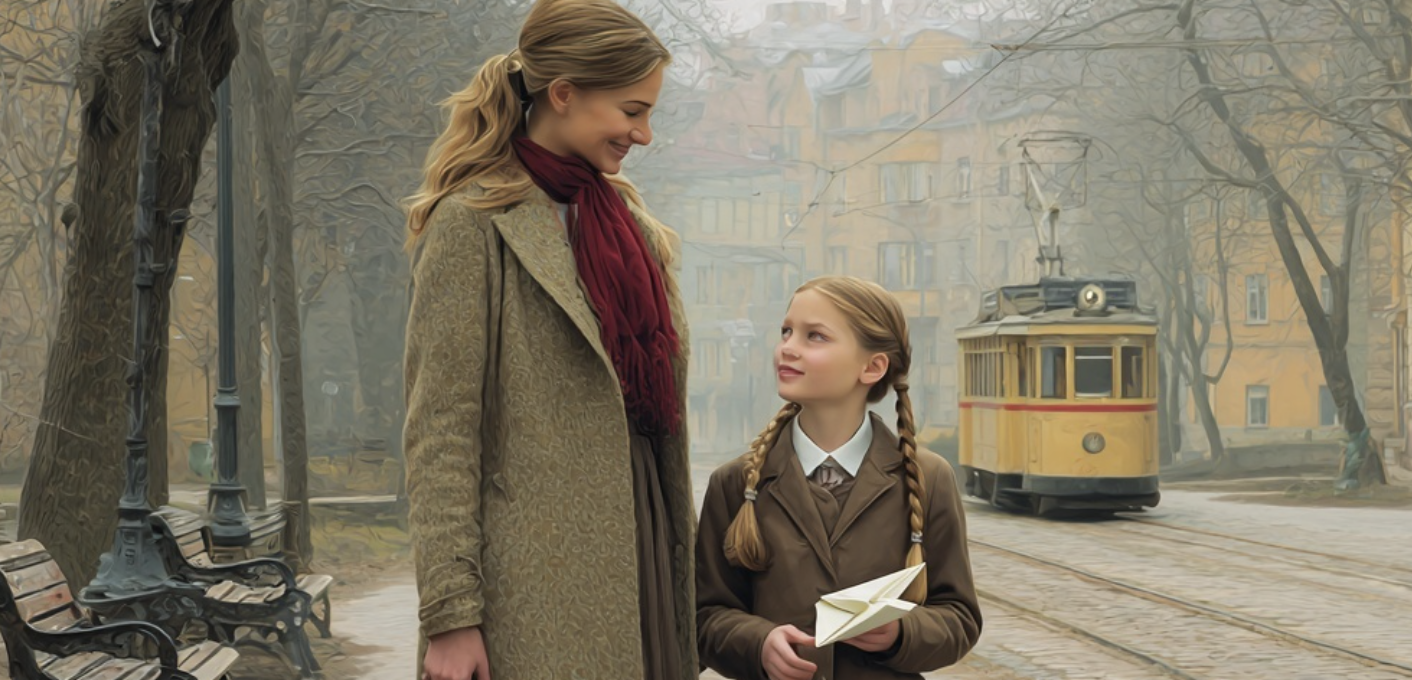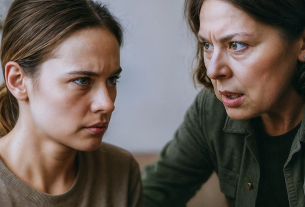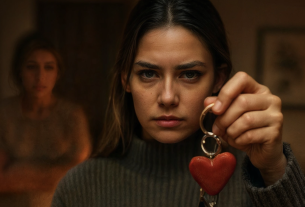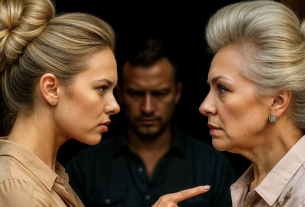The silence in the apartment was oppressive—thick as jelly, and just as sticky. Only the soft scrape of a fork along the rim of an almost empty plate disturbed it. At the table sat a small nine-year-old girl, her gaze fixed on the single spoonful of mashed potatoes smeared in a thin, pitiful layer across her plate. The sight tore the heart to pieces, because just a few hours earlier the whole kitchen had been filled with the intoxicating aroma of fried cutlets. The girl had seen with her own eyes how her grandmother, Veronika Pavlovna, stood at the stove. But now there was no trace of those cutlets—only this miserable smear on her plate.
Veronika Pavlovna, a woman with a tight gray bun and cold, steely eyes, looked at her granddaughter with undisguised irritation. It seemed the very presence of the child in the house caused her physical pain.
“Why are you staring like you’ve never been fed in your life?” Her voice cracked the silence like a whip. “Eat what you’re given. Not a child but a real punishment! You’ll grow up just like your mother, and then you’ll torment some poor woman’s nerves the way your mother torments mine!”
The girl’s name was Sonya. She was already nine, and her pure, unspoiled heart had learned to tell good from evil, sincerity from pretense. She understood perfectly that Veronika Pavlovna’s words were poison meant for both her and her mother. Her mama—beloved, kind—always asked her not to pay attention to Grandma’s grumbling, saying that old people can have difficult personalities. But how could you not pay attention when every word pricked like a needle? Children are the most honest creatures in the world; they don’t know how to wear masks and pretend they don’t feel pain.
Sonya took a deep breath, mustering her courage. Her little stomach cramped with hunger, and in her mind’s eye she saw the juicy, golden-browned cutlets.
“Veronika Pavlovna,” she began quietly, almost in a whisper, “may I please have at least one cutlet? Or some more mashed potatoes? You gave me very little—I won’t get full on this.”
The woman snorted, her face twisting in a grimace of disgust.
“Little?!” she shrieked. “Have you ever looked at yourself in the mirror? You’ve got more extra weight than a hippopotamus! What you’ve got is plenty! Time to slim down, not stuff yourself!”
Tears welled in Sonya’s eyes, but she brushed them away with the back of her hand, remembering her mother’s instruction to be strong.
“But Mama said I should always say if I don’t have enough. I really am still hungry, and I really want a cutlet,” she said more steadily now, her voice carrying a not-so-childish persistence born of a fair and simple hunger.
Veronika Pavlovna shot up from her chair, her face flushing dark red with anger.
“You want a cutlet? You ungrateful brat! I’ll give you a cutlet! Get up from the table and march to your room! If you’ve got time to chatter, you’re obviously full! And do you even know whose money paid for all this food? My son’s money! I cooked those cutlets for him, not for you! My son is under no obligation to feed someone else’s child!”
She seized Sonya by her thin wrist so hard that red marks instantly sprang up from her fingers. Yanking her from the chair, she spun her toward the hallway. Sonya thought a cuff or a kick would follow any second, but the woman only shoved her hard between the shoulder blades. Frightened, humiliated, with a lump of hurt rising in her throat, Sonya ran to her room, slammed the door, and climbed onto the bed, burying her face in the pillow to muffle her sobs.
She wanted to text her mother, to complain, to ask for help—but to her horror she realized she’d left her phone on the kitchen table. Going back was terrifying—her knees shook at the thought. Who knew what else that cruel, frightening woman might do? She ground her teeth and shot thunderbolts at the wall with her eyes. Sonya had never met people like this before. In that moment her heart clenched with a sharp, physical longing for her real grandmother, Galina Sergeyevna. That one had always been kind, always slipped pies into her hands with a joking scold that her granddaughter’s cheeks had gotten far too thin and that something must be done about it at once. Veronika Pavlovna was her complete, horrifying opposite. The last thing Sonya wanted was to be left alone with her.
All that endlessly long day Sonya sat in her room, afraid to even step out to the bathroom. She was afraid of provoking another outburst of rage. It reminded her of the story about the Kid and Karlsson, where there was a real household tyrant. But that Fröken Bok turned out kind in the end, whereas Veronika Pavlovna—or “Grandma Vera,” as Sonya was strictly forbidden to call her—was unlikely ever to thaw. Maybe she’d become like this because of the chemicals she worked with and always referenced? Maybe they had poisoned not only her body, but her soul?
In the evening Sonya’s mother, Anna, finally came home from work. She was anxious and distressed, since her daughter hadn’t replied to messages all day. But she didn’t even have time to take off her coat before Veronika Pavlovna appeared in the kitchen doorway.
“Anna, at last! Your Sonya is fine, if you care in the least,” she began with a false sigh. “She tormented my nerves all day, refused to eat, threw fits, turned up her nose at my cutlets, and locked herself in her room. You need to be stricter with her! You’ve spoiled the child rotten, and now other people have to pay for it!”
At that moment Anna’s husband, Artyom, came home from work as well. He was tired, but immediately on his guard because of the oppressive atmosphere in the house, and he hurried to find out what was wrong. Veronika Pavlovna launched straight into her performance. She complained, wept, wrung her hands, and told them what an unbearable punishment the girl was—how ungrateful and ill-mannered. She seasoned every word with deep, suffering sighs and even squeezed out a couple of fake tears for plausibility.
“That’s strange, Mom,” Artyom said, baffled, shrugging. “Sonya has always been a very calm and obedient child. We’ve never had problems like that with her.”
Anna, listening no longer, knocked on her daughter’s door. It opened, and a pale Sonya with tear-swollen eyes stood on the threshold. She flung herself silently at her mother’s neck and burst into tears, pressing herself against the dearest person in the world. Her stomach growled, loud and painful with hunger. She was emotionally and physically exhausted after a day spent in fear and solitude.
“My sweet girl, what happened? Why did you refuse to eat?” Anna asked softly, sitting with her daughter on the bed and wrapping an arm around her thin shoulders.
Just then Veronika Pavlovna walked back into the room. She planted her fists on her hips, and her stare—brimming with hatred and threat—bored into Sonya. Without words it screamed: Just try to complain, just try to tell the truth—and you’ll be sorry.
Sonya felt afraid. Terribly afraid. She didn’t want to lie to her mother, the person closest to her in the world. But she was mortally afraid of this woman’s anger. Would Mama believe her? Would Artyom? Or would everyone take the side of the “poor, sick grandmother”?
“I… I didn’t refuse,” she whispered, her voice shaking and breaking with tears. But then she remembered her real grandmother, Galina Sergeyevna, saying: “Fear is bad, sunshine. Never be silent about your pain. The truth must always be spoken out loud.”
“Just look at her!” Veronika Pavlovna screeched again. “She lies without batting an eye! What else have you dreamed up about me? Did I tell you they used to cut out tongues for lying in the old days?”
At that moment the fear inside Sonya vanished. It was as if a warm wind had blown it away—the wind of a mother’s love and support that she felt in Anna’s arms. Mama believed her; she felt it in every cell of her small heart.
“Then you would have been without a tongue long ago!” Sonya blurted out, unexpectedly firm and loud, meeting Veronika Pavlovna’s eyes head-on. “And I have nothing to be ashamed of, because I’m telling the truth!”
The effect was instantaneous. With a theatrical cry, Veronika Pavlovna clutched at her heart, rolled her eyes, and began to slide to the floor, moaning and lamenting that she was about to have an attack, that they were driving her to the grave, demanding her son come at once to save her from this monster in a child’s body.
Artyom rushed to his mother, helped her up, and led her to the kitchen, throwing annihilating, reproachful looks at Anna and Sonya. Once again, only mother and daughter remained in the room.
“Sweetheart,” Anna asked very carefully, stroking Sonya’s hair, “did she really… really speak to you like that? Call you those names?”
Sonya only nodded, and the tears poured again. She showed her mother her wrist, where a bluish mark was already rising from Veronika Pavlovna’s rough grip. Anna flinched; her own heart tightened with pain and anger. She understood everything. She understood that she could no longer leave her daughter alone with this woman—not for a second.
“That’s enough, baby, hush now. I’ll talk to Artyom. Tomorrow’s my day off, I’ll stay with you, and then… then Grandma Galya will come. You’ve been waiting for her so much, haven’t you?”
Sonya’s face lit with a faint but genuine smile through the tears. She nodded. She was already old enough to stay by herself, but lately there had been more burglaries in their neighborhood, and Anna worried. She had originally arranged for the summer with Galina Sergeyevna, but Artyom had insisted that his mother should help. And here was the result. His mother hadn’t wanted to help—she had wanted to rule and torment. And she hadn’t refused the money they had to pay her, whereas Galina Sergeyevna had always helped simply out of love.
After finally feeding her daughter to satiety, tucking her into bed, and sitting by her for a long time until Sonya’s breathing grew even and calm, Anna took a shower. She waited for her husband, hoping for a serious conversation. But he came into the bedroom very late, his face dark and closed.
“Mom is unwell—very unwell,” he began without preamble. “We barely brought her around. Your daughter will have to apologize to her tomorrow. My mother would never say such things—she’s an adult and understands that a child can repeat everything.”
“Are you serious, Artyom?” Anna could not believe her ears. “Do you think my nine-year-old daughter has a reason to invent such horrible things? And your mother has no reason at all? Look at Sonya’s arm! Look at the bruise! This isn’t normal!”
“And is it normal that my mother nearly had a heart attack because of this spectacle?” he retorted coldly.
Anna clenched her teeth. She wanted to shout that his mother was a professional actress and manipulator, that this was far from her first performance. But the words stuck in her throat. She realized it was useless to prove anything to a man blinded by filial duty and pity. In that second she wanted only one thing—to protect her child.
“Artyom, your mother has to leave tomorrow. They don’t get along. That’s a fact. Galina Sergeyevna will watch Sonya.”
“No,” he cut her off in an icy tone that left no room for discussion. “I don’t need a stranger in my apartment. What, do you still love your late husband? Is that why you dance to his mother’s tune and mistreat mine every which way? Don’t even think about it. Galina Sergeyevna will not set foot in this house again. That’s my final decision. I’m sleeping on the couch in the living room tonight to be near Mom in case she gets worse.”
He turned and left, slamming the door. Anna sat on the bed staring at the closed door, unable to make sense of what had just happened. His jealousy of the past, his blind, ruinous faith in his mother… What “heart attack”? She had seen perfectly well that the woman was pretending. Anna didn’t sleep a wink that night.
In the morning Artyom, without meeting his wife’s eyes, confirmed that he didn’t intend to change his decision. Either Sonya stayed with his mother, or she stayed home alone. He didn’t say a word to Sonya that day, ignoring her entirely, and at last a simple, terrifying truth dawned on Anna: her daughter was superfluous here. And if her own flesh and blood was unwelcome, then there was no place for Anna herself in this house either.
But where could she go? She had no home of her own. After her father’s death, her older sister had taken all the inheritance, leaving Anna with nothing. With her first husband they had made plans, dreamed of a mortgage, but there wasn’t time… He died tragically. For a while she and Sonya lived with Galina Sergeyevna, then they rented a small apartment, and two years ago she met Artyom. She rushed into marriage, afraid of loneliness, wanting to give her daughter a complete family. And now she bitterly regretted it. She understood it was time to put a big, final period where for years she had put an ellipsis, naively hoping that things would somehow settle down and work out.
“Mama, why are you putting clothes in the suitcase?” Sonya asked fearfully, peeking into the bedroom.
“We’re leaving here, my love.”
“Where?” The girl’s eyes rounded with surprise and a vague anxiety.
“I don’t know yet. Probably to Grandma Galya’s. And then we’ll see. It’s time, honey, for us to get a place of our own.”
“And Papa Artyom? Do you not love him anymore?”
Anna crouched before her daughter and looked into her eyes. Did she love Artyom? She respected him, valued him as a support, felt affection—but that all-consuming, real love she had once known was not here. And, as it turned out, that was for the best. Because he didn’t love her either.
“He doesn’t love us, sunshine. And if that’s the case, we have no business staying here.”
That day Veronika Pavlovna didn’t leave her room, playing the dying victim. A couple of times she darted into the kitchen, thinking she wasn’t being heard, and it made Anna feel all the more disgusted and bitter.
A call came from Artyom. He demanded that his wife immediately take care of his mother—feed her, tidy up.
“You’ve ignored her all day, and she doesn’t even have a glass of water! What kind of attitude is that, Anna? You’d be jumping around your former mother-in-law like a clown, of course!”
Anna said nothing. She simply declined the call and went on packing. She no longer had the strength or desire to argue or prove anything.
A taxi took them to a familiar building entrance. When Galina Sergeyevna opened the door and saw them with a suitcase, she asked nothing—she just hugged them both and let them in.
After hearing the whole story, she didn’t scold or give advice. She simply shook her head and hugged Anna again.
“My dear girl, you did the right thing coming here. After my Seryozhenka’s death, you and Sonya are all the family I have. Good. You’ll live here for a while, calm down, think everything over. If you decide to divorce, we’ll find a way. We have the old dacha—Sergey’s father loved it, but it’s standing empty now. We could sell it, sell this apartment of mine, buy me a small studio, and something modest but your own for you and Sonya. Not a palace, of course, but you’d have your own roof. And I’ll always help you. I love spending time with my granddaughter so much.”
Anna looked at her former mother-in-law, and tears rose to her eyes again, but now they were tears of relief and gratitude. People say all mothers-in-law are villains, but here before her was a living counterexample. For a moment she even wondered: maybe she herself had been unfair to Vera Pavlovna? But no. That woman had been against her from the very beginning—against her child—and in the end she had simply driven them out.
When Artyom learned that his wife had left, he didn’t make a scene. He agreed to the divorce coolly, declaring that his mother had been right to call Anna the biggest mistake of his life. Anna didn’t argue. She needed only one thing—freedom and peace for herself and her daughter.
With triumph, Veronika Pavlovna moved in with her son and rented out her own apartment. She announced that living on one pension was hard and that her son was simply obliged to support her. But disappointment awaited her. It turned out Artyom was paying off a large car loan and couldn’t provide her a luxurious life. And if before she had thought he was the one who kept the fridge stocked to bursting, she now realized whose labor and frugality had actually done that.
Galina Sergeyevna urged a quick sale of the property, but Anna persuaded her not to rush. They decided to live as a threesome for a while: Sonya would be looked after, and they could save money without burdening the older woman. The main thing was that they were together now. In quiet and safety, behind a door closed against malice and misunderstanding. Anna knew for sure she wouldn’t put a cross over her personal life. But next time she would look not only at the man, she would look more closely at his relationship with his mother. So she would never be burned again. So there would never again be quiet tears behind a closed door in their lives.



